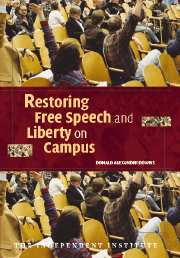Book contents
- Frontmatter
- Contents
- Acknowledgments
- Preface
- PART I INTRODUCTION AND BACKGROUND
- PART II CASE STUDIES IN THE POLITICS OF CIVIL LIBERTY ON CAMPUS
- 3 Columbia's Sexual Misconduct Policy: Civil Liberty versus Solidarity
- 4 Berkeley and the Rise of the Anti–Free Speech Movement
- 5 Undue Process at Penn
- 6 Renewal: The Rise of the Free Speech Movement at Wisconsin
- 7 Abolition in the Wisconsin Faculty Senate and Its Aftermath
- PART III CONCLUSIONS
- Appendix
- Index
6 - Renewal: The Rise of the Free Speech Movement at Wisconsin
Published online by Cambridge University Press: 12 July 2009
- Frontmatter
- Contents
- Acknowledgments
- Preface
- PART I INTRODUCTION AND BACKGROUND
- PART II CASE STUDIES IN THE POLITICS OF CIVIL LIBERTY ON CAMPUS
- 3 Columbia's Sexual Misconduct Policy: Civil Liberty versus Solidarity
- 4 Berkeley and the Rise of the Anti–Free Speech Movement
- 5 Undue Process at Penn
- 6 Renewal: The Rise of the Free Speech Movement at Wisconsin
- 7 Abolition in the Wisconsin Faculty Senate and Its Aftermath
- PART III CONCLUSIONS
- Appendix
- Index
Summary
The University of Wisconsin at Madison, one of the country's first major research universities, has long been a national leader not only in research but also in academic freedom. At the end of the nineteenth century it witnessed a major battle over academic freedom when members of the board of regents sought to oust progressive political economist Richard T. Ely because of his prolabor and prostrike views. After a trial accompanied by a great deal of publicity, the regents refused to dismiss Ely in one of the most important victories for academic freedom during an era that often pitted the academic freedom claims of the rising social sciences against the proprietary claims of capitalistic trustees. In its report on the case, the regents declared that the commitment to academic freedom was the university's most important mission. The Ely case stands as a landmark in the history of academic freedom in America, something of which the University of Wisconsin is justly proud.
The regents' statement analyzed the university's role in promoting the “vast diversity of views regarding the great questions which at present agitate the mind.” It also linked academic freedom to the facts of human fallibility and the inherently incomplete state of knowledge. “We cannot for a moment believe this knowledge has reached its final goal, or that the present condition of society is perfect.”
- Type
- Chapter
- Information
- Restoring Free Speech and Liberty on Campus , pp. 190 - 227Publisher: Cambridge University PressPrint publication year: 2004



